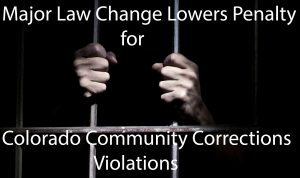Major Change Lowers Penalty for Colorado Community Corrections Violations
 By H. Michael Steinberg Colorado Criminal Defense Lawyer
By H. Michael Steinberg Colorado Criminal Defense Lawyer
Introduction
Two significant changes that will have a major impact on cases involving alleged violations of Colorado Community Correction sentences were quietly enacted in 2020.
The Prison Population Reduction and Management Act 18-8-208(11), C.R.S. (The Prison Reduction Act – “the Act”), (H.B. 20-1019, 72d Gen. Assemb., 2d Reg. Sess., 2020 Colo. Sess. Laws 23) was made effective in March of 2020.
I. The Right to an Evidentiary Hearing Before Community Corrections Before Rejection and Transfer
One of the most egregious miscarriages of justice in the Colorado criminal justice system has been at least partially addressed by the new legislation. Prior to 2020 the Colorado Prison Reduction Act, an offender was not entitled to an evidentiary hearing for re-sentencing when that offender was rejected by a community corrections program based on alleged violations of the rules and regulations of that program.
The new law requires the original sentencing court to provide an alleged violator with a right to a contested evidentiary hearing to have an opportunity to contest and to rebut the reasons for the rejection.
In the alternative, the law provides for a new sentencing hearing before termination from community corrections and reassignment back to a locked Department of Corrections prison facility.
Here is the relevant section of the new law – 18-1.3-301 (1)(g):
Section 18-1.3-301 (1)(g). Authority to Place Offenders in Community
[In relevant part]
“The sentencing court shall provide the offender with a new sentencing hearing, for any termination from a community corrections program, including a violation of section 18-8-208.2.
At any new sentencing hearing, the court may consider any sentencing alternative originally available to the court when ordering the appropriate sentence.”
II. Unauthorized Absence Charged in Lieu of Felony Escape for Leaving and Failing to Return to a Community Corrections Program – 18-8-208.2 C.R.S.
The act of leaving and failing to return to a community corrections facility can no longer be charged as a felony-level escape. Instead, a new crime entitled “unauthorized absence,” a class 3 misdemeanor must now be charged.
What follows is a reprint of the new law:
Section 18-8-208.2 – Unauthorized Absence
(1) A person who is serving a direct sentence to a community corrections program pursuant to section 18-1.3-301; transitioning from the department of corrections to a community corrections program or placed in an intensive supervision program pursuant to section 17-27.5-101; participating in a work-release or home detention program pursuant to 18-1.3-106 (1.1), intensive supervision program, or any other similar authorized supervised or unsupervised absence from a detention facility as defined in section 18-8-203(3); or is housed in a staff secure facility as defined in section 19-1-103 (101.5) commits the crime of unauthorized absence if the person knowingly:
(a) Leaves or fails to return to his or her residential or facility location without permission of the supervising agency and in violation of the terms and conditions of supervision; or
(b) Removes or tampers with an electronic monitoring device required by the supervising agency to be worn by the person in order to monitor his or her location, without permission and with the intent to avoid arrest, prosecution, monitoring, or other legal process.
(2) (a) If a person commits unauthorized absence for a crime listed in section 24-4.1-302(1) or a crime of violence as described in section 18-1.3-406, unauthorized absence is a class 6 felony and an attempt thereof is a class 6 felony.
(b) If a person commits unauthorized absence for a crime other than the crimes listed in section 24-4.1-302(1) and the crime is not a crime of violence as described in section 18-1.3-406, unauthorized absence is a class 3 misdemeanor and an attempt thereof is a class 3 misdemeanor.
(c) A person who knowingly violates a permanent or temporary protection order issued pursuant to section 18-1-1001(1), 13-14-103, 13-14-104.5, or 13-14-106 during the commission of unauthorized absence commits a class 3 felony.
(3) If a parolee placed in a community corrections or in an intensive supervision program pursuant to section 17-27.5-101 has an unauthorized absence, the department of corrections shall notify the appropriate community reentry program described in section 17-33-101(7)(a) and provide contact information for the purposes of assisting the person to reengage with supervision.
Analysis of the Mechanism Behind this Important Change – the Crime of Unauthorized Absence
House Bill 20-1019 changed the type of conduct for which a defendant could be charged with escape. The new law provides that a person serving, for example, a direct sentence to community corrections is now considered “not in custody or confinement” for purposes of the statute. (See Section 18-8-208(11), C.R.S.
Escape or attempted escape cannot be charged if the accused is not “in custody.” If, when serving a sentence in a community corrections facility, a person’s status has been categorized as legally not “in custody,” then leaving and failing to return to a community corrections facility can no longer be an escape. Instead, such conduct is now the crime of “unauthorized absence.”
The change is of enormous significance. Escape is a class 3 felony charge, an offense punishable by up to twelve years in jail. A charge of unauthorized absence is a class 3 misdemeanor punishable by no more than six months in jail. Section18-8-208.2(2)(b).
The Mechanism of Change: What Does it Mean to Change the “Status” of the Person Sentenced?
The new law accomplishes this important change by redefining the ‘status” of the sentence imposed. Certain types of sentences, previously included in the felony crime of escape and attempted escape, are now excluded.
The law redefines the important requirement of “in custody or confinement” required to charge escape to als0 includes many other similar types of sentences:
Direct sentences to, or transitioning from the department (of corrections) to, a community corrections program;
Participating in a work release or home detention program;
An intensive supervision program or any other similar authorized supervised or unsupervised absence from a detention facility;
Being housed in a staff-secure facility; or
Placement in an intensive supervision parole program.
A Closer Look at the New Crime of Unauthorized Absence
The Crime of Unauthorized Absence
The new law, the crime of unauthorized absence now applies when:
A person is serving a supervised sentence outside of a prison and he or she:
Leaves or fails to return to his or her residential or facility location without permission of the supervising agency and in violation of the terms and conditions of supervision;
or
Removes or tampers with an electronic monitoring device required by the supervising agency to be worn by the person in order to monitor his or her location without permission and with the intent to avoid arrest, prosecution, monitoring, or other legal processes.
Another Benefit of the New Law – It May Be Applied Retroactively
As explained above, House Bill 20-1019, the Prison Reform Act, reduced the penalty and level of offense by redefining custody and confinement to remove certain conduct previously associated with the felony crime of escape. It is clear that every new or unresolved case filed will fall under the new configuration, but what about defendants who have previously been convicted under the old law?
As discussed, the new law is legally categorized as “ameliorative legislation.” Ameliorative laws, such as the new crime of “unauthorized absence,” are “ameliorative” because the new crime mitigates the penalty for earlier illegal conduct.
Ameliorative means “to make or become better, more bearable, or more satisfactory; improve: strategies to ameliorate negative effects on the environment.” (Merriam Webster)
When a new law is interpreted as ameliorative legislation, a person accused of the previous crime (in this case felony escape) may be entitled to the retroactive application and benefit of the new law.
An explanation is necessary to explain why this new law can be applied to convictions entered prior to the creation of the law may be helpful.
Typically, new criminal statutes are presumed to operate prospectively – i.e. focused on crimes that have not been resolved on the effective date of the new law.
Colorado laws – Section 2-4-202, C.R.S., and Section 2-4-303, C.R.S. provide the standards in this area:
“The [amendment] of any statute or part of a statute . . . shall not have the effect to release, extinguish, alter, modify, or change . . . any penalty, forfeiture, or liability . . . which shall have been incurred under such statute, unless the repealing, revising, amending, or consolidating act so expressly provides . . . .”
If a new law is not specific as to whether it will be applied only prospectively and not retroactively, a defendant may seek the retroactive application of the new law if he or she directly benefits from the change in the law.
Colorado law provides, under Section 18-1-410(1)(f)(I), C.R.S. that a Colorado defendant may request post-conviction relief if :
“there has been significant change in the law, applied to the applicant’s conviction or sentence, allowing in the interests of justice retroactive application of the changed legal standard”.
Since H.B. 20-1019, the Prison Reform Act is clearly a “significant change in the law” that does not contain language indicating that it applies only prospectively… therefore it may be applied retroactively.
The newly enacted statute changes the category of crime for conduct that was previously chargeable as felony escape therefore those convicted under the old law now have the right to seek the shelter the change provides which is a modification of their sentence.
“A person charged with a crime requires the guiding hand of counsel at every step in the proceedings against him. Without it, though he be not guilty, he faces the danger of conviction because he does not know how to establish his innocence.”
United States Supreme Court – Powell v. Alabama, 287 U.S. 45, 69 (1932)
If you found any information I have provided on this web page article helpful please share it with others over social media so they may also find it. Thank you.
Never stop fighting – never stop believing in yourself and your right to due process of law.
 ABOUT THE AUTHOR: H. Michael Steinberg – Email The Author at hmsteinberg@hotmail.com – A Denver Colorado Criminal Defense Lawyer – or call his office at 303-627-7777 during business hours – or call his cell if you cannot wait and need his immediate assistance – 720-220-2277. Attorney H. Michael Steinberg is passionate about criminal defense. His extensive knowledge of Colorado Criminal Law and his 38 plus years of experience in the courtrooms of Colorado may give him the edge you need to properly defend your case.
ABOUT THE AUTHOR: H. Michael Steinberg – Email The Author at hmsteinberg@hotmail.com – A Denver Colorado Criminal Defense Lawyer – or call his office at 303-627-7777 during business hours – or call his cell if you cannot wait and need his immediate assistance – 720-220-2277. Attorney H. Michael Steinberg is passionate about criminal defense. His extensive knowledge of Colorado Criminal Law and his 38 plus years of experience in the courtrooms of Colorado may give him the edge you need to properly defend your case.
 Colorado Criminal Lawyer Blog
Colorado Criminal Lawyer Blog

